Meet the neo-peasants: An Aussie family taking on our ‘culture of excess’
THIS family is rebelling from our “culture of excess”, and they have strong stomachs. Think re-usable toilet paper and road kill for dinner.
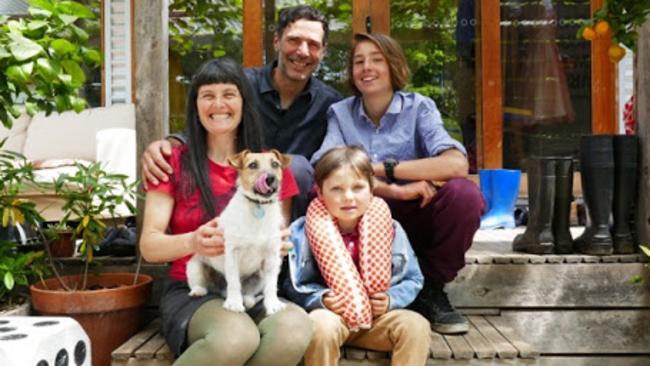
WARNING: Graphic content
HIPSTERS, drop your turmeric latte and turn down The Smiths, there’s a new subculture of nonconformists on the block and you’ll need more than a bushy beard and a fedora to join in.
Enter the neo peasant.
They’re fit, they’re frugal, they’re foragers, they’re facing our “culture of extreme excess” head on — and they have very strong stomachs.
Think re-usable toilet paper, road kill for dinner, push bike-powered travel, homeschooling and humanure.
Neo peasants from Daylesford in regional Victoria, Meg Ulman and Patrick Jones, are defining the art of “voluntary simplicity” and “reclaiming the skills, resilience and adaptability everyone is going to need in the future”.
You won’t find them in a supermarket, owning or driving a car, watching television, using a credit card or working the 9-5.
Their days are filled with foraging, hunting, preserving, brewing, bartering and fermenting to keep food on the table.
“A neo-peasant is someone who’s involved primarily in the household and community economies and resists wage-slavery, debt, and the heavily-militarised global economy,” Mr Jones said.
“They do not have to go to work to pay down debt, and therefore have time to organise and be accountable for their own food and energy resources.”
Sounds better than your office job, right?
But don’t be mistaken, a neo peasant hasn’t got time to laze about.
Not many of us had to split wood to stoke our stove or hot wash the “family cloth” today — the old flannel bed sheet Meg and Patrick have cut into squares and stitched to replace toilet paper.
“By not buying toilet paper we save over $300 a year,” Ms Ulman said.
“We’ve always been frugal, but it’s been about a decade since we’ve really concentrated our efforts to become dedicated non-polluters.”
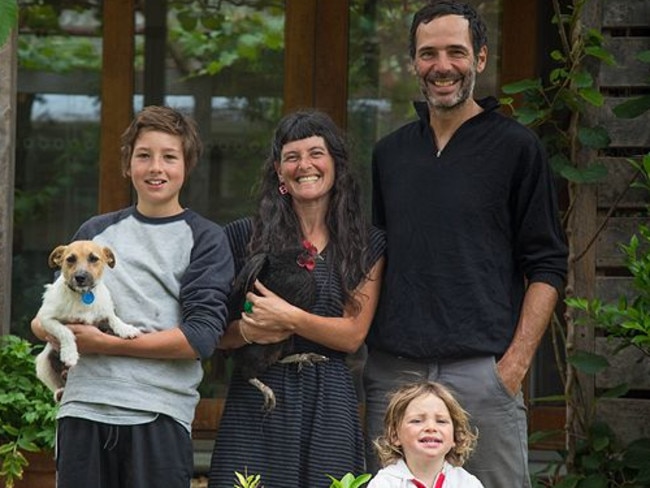
It’s hot, heavy, hard work, but they are nauseated by the prospect of running down to the supermarket and buying a hot chicken for dinner — don’t worry, I’ve asked.
“We wouldn’t touch a chicken from a supermarket because that hen has more than likely come from a prison-like existence and been tortured in death,” Mr Jones said.
“The packaged food of supermarkets is mostly laced with refined sugars, harmful additives and carcinogens, and the so-called ‘fresh food’ is long-termed stored, sprayed with harmful methyl bromide, refrigerants or other nasties and has little nutrition.”
Excuse me for a moment while I torch the entire contents of my pantry.
One look at the couple’s four-year-old, Blackwood, will also have you prizing that lollipop out of your toddler’s mouth.
“Woody” has never touched processed sugar.
“A treat for Woody is a mandarin picked off the tree, a handful of ripe berries or a sweet red capsicum,” Ms Ulman says.
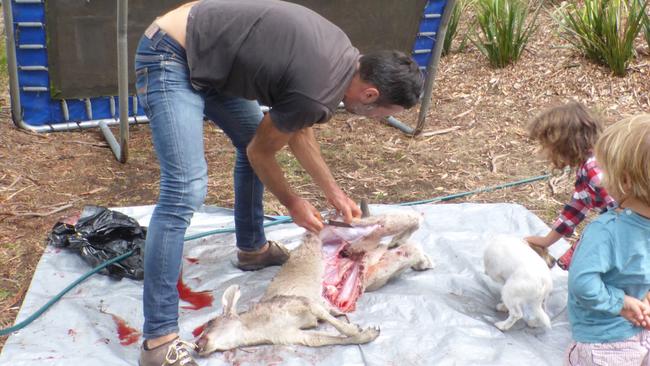
“We don’t shop at supermarkets so there are no shiny packets or chocolate bars to entice him and we don’t own a television so there are no ads to seduce him.”
Ms Ulman said before they committed to a neo peasantry lifestyle they were “riddled with anxiety and helplessness about the state of the world”.
Mr Jones goes as far as to say it’s a move they made before they were forced to simplify with “global economic contraction and even collapse”.
“We live in a culture of extreme excess, built on the myth of permanent growth and endless crude oil,” he said.
“This oil-induced affluence is fleeting; it can’t keep growing because we live on a finite planet and the science fictions of mining other planets for resources is far-fetched and wishful thinking.”
So let’s look at the average Aussie.
We work all week for multinationals to buy appliances that cost us a lot in electricity to turn on.
Let’s not get started on how much waste the average household turns out in comparison to Meg and Patrick — they’ve even found a way to re-use their own poo.
“Humanure is composted and recycled, wastewater is filtered and fed into garden swales, food scraps from our own kitchen and local cafes are fed to our worms, chickens and ducks,” Mr Jones says.
“We shower once or twice a week.
“The water is then piped into our garden.”
The family also has two composting toilets, a rainwater washing machine powered by solar and strict rules about internet access for their 14-year-old son Zephyr — who happens to live in a tiny house in the backyard that he co-built from recycled materials.
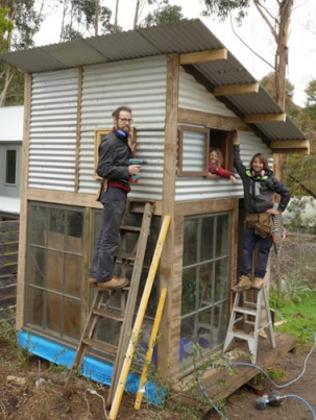
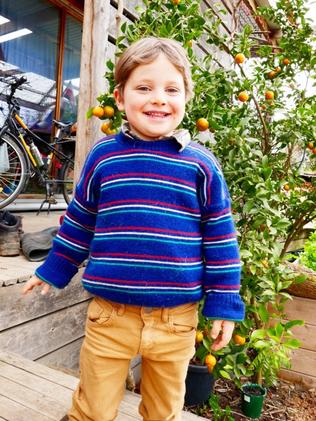
The neo peasants have a theory about tiny house living too, you see.
“It is an expression of people using technology appropriately, and living within their means,” Mr Jones said.
“While the real estate market remains a giant Ponzi scheme the tiny house movement will continue to grow.”
But if shovelling your own poo, washing your toilet paper or cooking up fresh road kill for dinner (as Meg and Patrick did on their 14-month foraging tour of Australia by bicycle) is too much to swallow; Kirsten Bradley from Milkwood Permaculture has some advice.
“Start with changing one thing at a time,” Ms Bradley said.
“If you eat a lot of bread, learn how to make it.
“Then stick with making your own bread until you’re ready to add a new habit.
“If you create these new habits every 6 months or so then within 5 years you’ll have made a fundamental change to your family life.”
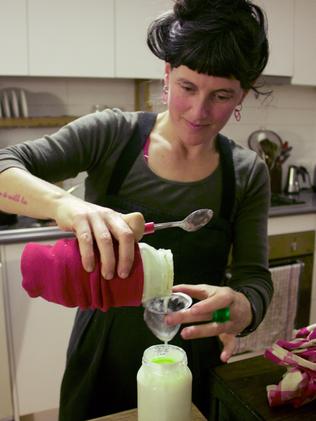
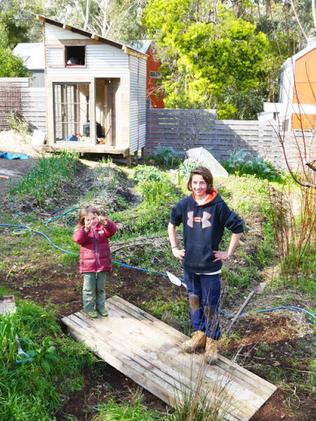
Milkwood offer training courses in home gardening, bee keeping, natural building, permaculture and regenerative agriculture — making mini neo peasants out of us all.
Murdoch University School of Arts Associate Professor Dr Carol Warren said there was “something of a millenarian movement in the extremity of a neo peasant’s position on some issues” but she conceded the idea we are morally-responsible to live within an ecologically-sustainable footprint was laudable.
“The current prominence of food and energy security issues in global policy circles indicates that the neo-peasant focus on basic needs in a context of global environmental decline is a legitimate one,” Dr Warren said.
You can follow Meg and Patrick’s journeys in neo peasantry at www.theartistasfamily.blogspot.com.



